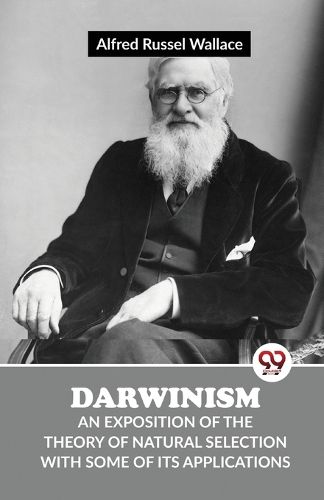Readings Newsletter
Become a Readings Member to make your shopping experience even easier.
Sign in or sign up for free!
You’re not far away from qualifying for FREE standard shipping within Australia
You’ve qualified for FREE standard shipping within Australia
The cart is loading…






This title is printed to order. This book may have been self-published. If so, we cannot guarantee the quality of the content. In the main most books will have gone through the editing process however some may not. We therefore suggest that you be aware of this before ordering this book. If in doubt check either the author or publisher’s details as we are unable to accept any returns unless they are faulty. Please contact us if you have any questions.
Alfred Russel Wallace was a British naturalist and explorer who independently discovered the theory of evolution through natural selection around the same time as Charles Darwin. In his book, "Darwinism: An Exposition of the Theory of Natural Selection with Some of Its Applications," Wallace explains the key principles of Darwin's theory and their implications for the understanding of life on earth. Wallace argues that the principle of natural selection is the driving force behind the evolution of species, with organisms that are better adapted to their environment more likely to survive and reproduce. He also discusses the concept of variation, or the idea that individuals within a species exhibit differences that can be inherited by their offspring and that can accumulate over time. Wallace also delves into the social implications of Darwin's theory, noting that it challenges traditional religious and philosophical views of human nature and our place in the natural world. He argues that Darwinism offers a more rational and scientific approach to understanding the diversity of life on earth and our own place in the evolutionary process. Overall, Wallace's "Darwinism" provides a clear and concise overview of the theory of natural selection and its applications, as well as its broader implications for science, philosophy, and society.
$9.00 standard shipping within Australia
FREE standard shipping within Australia for orders over $100.00
Express & International shipping calculated at checkout
This title is printed to order. This book may have been self-published. If so, we cannot guarantee the quality of the content. In the main most books will have gone through the editing process however some may not. We therefore suggest that you be aware of this before ordering this book. If in doubt check either the author or publisher’s details as we are unable to accept any returns unless they are faulty. Please contact us if you have any questions.
Alfred Russel Wallace was a British naturalist and explorer who independently discovered the theory of evolution through natural selection around the same time as Charles Darwin. In his book, "Darwinism: An Exposition of the Theory of Natural Selection with Some of Its Applications," Wallace explains the key principles of Darwin's theory and their implications for the understanding of life on earth. Wallace argues that the principle of natural selection is the driving force behind the evolution of species, with organisms that are better adapted to their environment more likely to survive and reproduce. He also discusses the concept of variation, or the idea that individuals within a species exhibit differences that can be inherited by their offspring and that can accumulate over time. Wallace also delves into the social implications of Darwin's theory, noting that it challenges traditional religious and philosophical views of human nature and our place in the natural world. He argues that Darwinism offers a more rational and scientific approach to understanding the diversity of life on earth and our own place in the evolutionary process. Overall, Wallace's "Darwinism" provides a clear and concise overview of the theory of natural selection and its applications, as well as its broader implications for science, philosophy, and society.